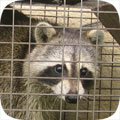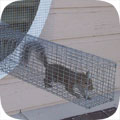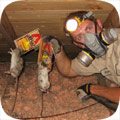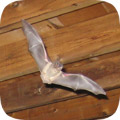- wakeforest@wildlifeanimalcontrol.com
Call 24/7 for a free quote:
919-636-4015
Wake Forest Wildlife Animal Control
Professional Wildlife Removal Company Servicing Wake Forest, NC
If you have a problem with wildlife in your Wake Forest home, your best option is to hire a company that specializes in North Carolina wildlife removal only. This is a specialty business, and regular pest control companies do not use the proper techniques to solve animal problems. I have spent many years reviewing North Carolina and Wake Forest, and I recommend the following:
Triangle Wildlife Removal
Cell Phone: 919-636-4015
NOTE: If you have a dog or cat problem, call Wake County Animal Services: (919) 212-7387

Triangle Wildlife Removal specializes primarily in removing animals from attics of homes and buildings - this includes squirrels in attics, raccoons, and rats or mice in homes. North Carolina also has a documented problem with
bats in buildings, and Triangle Wildlife Removal is specially trained in bat removal. They also perform general wildlife trapping services, such as the capture and removal of skunks or opossums on the
property. Call 919-636-4015 to discuss your critter problem and schedule a same-day or next-day appointment. Click here to learn more about what prices we charge in 2020.
When hiring a company to solve your wild animal problem, you want these features:
- Specializes in wildlife removal, not pest control
- Fully North Carolina and Wake County licensed and insured
- Works 7 days per week (critters don't take weekends off)
- Performs full building inspections: enters and inspects attic
- Performs exclusion repairs, with guarantee against animal re-entry
- Offers cleanup of biohazardous wildlife waste
Triangle Wildlife Removal is a full-service Wake Forest wildlife removal company. This is very different from a regular Wake Forest pest control company. The pest control companies spray poison to kill insects. This is not at all
similar to wildlife removal. Triangle Wildlife Removal performs a full inspection of the home or property, and determines why the animal(s) are there, and if inside a building, how the animals got inside. All
animals (including rodents) are trapped and removed, or if possible, removed from the building using special exclusion devices. Once the animals are gone, preventative repairs are essential, and
cleanup is sometimes recommended.
 Wake Forest wildlife trapping - it's not as simple as it may seem. It's illegal in North Carolina to trap without a license. Trap type is very important and there are many different types, bait is somewhat relevant, trap placement
is vital, and there are dozens of small things that are very important to know.
Safety is a concern. Then once the animal is trapped, it must be removed and dealt with in the proper manner according to North Carolina law. We offer Wake Forest raccoon removal. Read more about how to get rid of raccoons.
Wake Forest wildlife trapping - it's not as simple as it may seem. It's illegal in North Carolina to trap without a license. Trap type is very important and there are many different types, bait is somewhat relevant, trap placement
is vital, and there are dozens of small things that are very important to know.
Safety is a concern. Then once the animal is trapped, it must be removed and dealt with in the proper manner according to North Carolina law. We offer Wake Forest raccoon removal. Read more about how to get rid of raccoons.
 Animals in attics - this is our specialty at Triangle Wildlife Removal. Many types of animals like to live in attics. This includes squirrels, raccoons, rats, mice, bats, birds, and even possums. Critters like to go into attics for a safe place to live
and raise their young. Removing animals from attics is very complex work, partly because of the presence of baby animals. If you need Wake Forest squirrel removal, we can remove all the squirrels from your attic, and seal out any future ones. Read more about how to get rid of squirrels.
Animals in attics - this is our specialty at Triangle Wildlife Removal. Many types of animals like to live in attics. This includes squirrels, raccoons, rats, mice, bats, birds, and even possums. Critters like to go into attics for a safe place to live
and raise their young. Removing animals from attics is very complex work, partly because of the presence of baby animals. If you need Wake Forest squirrel removal, we can remove all the squirrels from your attic, and seal out any future ones. Read more about how to get rid of squirrels.
 Rodent control must be done in a very specific way. First off, the most important thing is that all the openings that rats and mice can use to enter a house be sealed. Then all the rodents must be physically trapped and removed.
Never, ever use poison! Most Wake Forest exterminators will just use this lazy poison technique to kill rodents, and it causes more harm than good - dead stinky rats, and it doesn't solve the problem. Call us for correct Wake Forest rat removal. Read more about how to get rid of rats.
Rodent control must be done in a very specific way. First off, the most important thing is that all the openings that rats and mice can use to enter a house be sealed. Then all the rodents must be physically trapped and removed.
Never, ever use poison! Most Wake Forest exterminators will just use this lazy poison technique to kill rodents, and it causes more harm than good - dead stinky rats, and it doesn't solve the problem. Call us for correct Wake Forest rat removal. Read more about how to get rid of rats.
 Bat removal is a highly specialized task. North Carolina is known to have colonizing bats who often live in buildings. Bats love attics. If not removed, the colony can grow to a very large size over the years. The bat droppings are often corrosive and
cause health risks. The same goes for bird droppings on or in buildings. We perform Wake Forest pigeon removal and bird control. But our specialty is Wake Forest bat removal. We remove 100% of the bat colony and seal the building so that it's totally bat-proof. Read more about how to get rid of bats.
Bat removal is a highly specialized task. North Carolina is known to have colonizing bats who often live in buildings. Bats love attics. If not removed, the colony can grow to a very large size over the years. The bat droppings are often corrosive and
cause health risks. The same goes for bird droppings on or in buildings. We perform Wake Forest pigeon removal and bird control. But our specialty is Wake Forest bat removal. We remove 100% of the bat colony and seal the building so that it's totally bat-proof. Read more about how to get rid of bats.
 If you have animals inside a house, no job is complete without proper exclusion repairs. If you simply hire a Wake Forest trapper who only removes the critters, then the problem will return. You need to hire a Wake Forest wildlife control company that identifies 100% of the animal entry points
into your building, and seals them shut with professional repairs. In addition, in many cases animals have left waste or contamination behind, and you'll want a company that can provide professional cleaning services. Triangle Wildlife Removal does both.
If you have animals inside a house, no job is complete without proper exclusion repairs. If you simply hire a Wake Forest trapper who only removes the critters, then the problem will return. You need to hire a Wake Forest wildlife control company that identifies 100% of the animal entry points
into your building, and seals them shut with professional repairs. In addition, in many cases animals have left waste or contamination behind, and you'll want a company that can provide professional cleaning services. Triangle Wildlife Removal does both.
The above are just some of the services offered by Triangle Wildlife Removal. We also trap and remove animals that destroy lawns, such as moles, or digging animals. Sometimes animals like opossums will live under buildings, steal pet food, raid garbage cans, etc.
Read about how to get rid of opossums. Skunks commonly live under sheds or decks, and set up a den. We can trap and remove them without them spraying. Read about how to get rid of skunks. Triangle Wildlife Removal
also provides dead animal removal in Wake Forest. If you need help with any other wildlife conflict, from a fox, beaver, groundhog, or any other critter, we can solve it. We also do Wake Forest snake removal - most of the snakes in North Carolina are not venomous, but
call us if you want safe removal, or read about how to get rid of snakes in Wake Forest. And remember, we are a private business, not Wake County Animal Control Services, so if you have a dog or cat problem, call the County at (919) 212-7387.
Wake County animal services does not handle any wildlife issues.
Triangle Wildlife Removal: 919-636-4015
Wake Forest Pricing Info For Year 2020
 Every wildlife removal situation is different, from the species of animals involved, the location of the animal inside a house or outside, the extent of repairs or cleanup, etc. It's impossible to give one-size-fits-all prices. Examples MIGHT include:
Every wildlife removal situation is different, from the species of animals involved, the location of the animal inside a house or outside, the extent of repairs or cleanup, etc. It's impossible to give one-size-fits-all prices. Examples MIGHT include:
Small Job: For example, a one-stop job to remove an animal in the yard: $100 on up
Medium Job: For example, getting critters out of your house with minor repairs: $300 on up
Large Job: For example, a project involving many service trips and complex work: $500 on up
Give us a phone call now and tell us about your wildlife issue and we will be able to give you a price estimate over the phone. If you're cool with it, we can schedule a same-day or next-day appointment if you like. Our prices are fair, and a good value because we do the job right, the first time.
Wake Forest Wildlife Tip #1:
Do female raccoons make good mothers?
Humans think that they are the only ones capable of being a good mother. But, even some species of animals are bound to provide the same concern for their babies, too. For example, female raccoons can make good mothers. They really can be a fantastic mother to provide their babies with care and nurture for them to survive as adults.
The moment that the female raccoon is pregnant, it already starts its ritual to prepare a secure and safe place. This is where its babies will be born. This will include a place like a shed or an attic wherein it will feel at peace that its babies will not be disturbed.
Female Raccoons Will Nurse Their Babies
Once their babies are born, female raccoons will nurse them for complete nourishment and care. Baby raccoons will feel helpless and will need such tender, love and care. Now, the mother raccoons will ensure of them to get the concern and care they need.
While the babies are growing, the mother raccoons will watch over them. Later on, they will develop claws and hair. And so, mothers will trap and will also capture food for them. They will teach their babies to be ready towards facing adulthood.
Female Raccoons Get Them Ready to Move into the Wilds
Female raccoons will also get female raccoons ready to move into the wilds. It is also easily noticed that they do not get in touch with them or even keep them. This is what is already known as instructional behavior of mother raccoons. The mothers will take good care of their babies. They have an instinct that tells them it is the right time to leave their babies. They get that feeling that their work is finally done.
Female Raccoons Will Prepare for a New Set of Young
In the coming year, female raccoons will prepare for a new set of young. They will go through the same process of taking good care of them and introducing them into their world. They will also finally release them out after they have become adults.
Female Raccoons Are Good In Helping Babies for the Future
The population of raccoon continues to move forward due to the circle of life. It only fairly demonstrates the fact that female raccoons can be a good mother. They help babies for the future and they know what to do to help them succeed. This is also particularly after they have become adults!
Wake Forest Wildlife Tip #2:
North Carolina Wildlife Information:
North Carolina State bird: Northern cardinal
State mammal: Gray squirrel
State reptile: Eastern box turtle
State fish: Channel bass
State insect: European honeybee
Few states have as nice of a geological flow as North Carolina. This state is divided almost into equal sections, making up three distinct habitat zones. The first zone, known as the coastal plain, starts with the sandy beaches by the Atlantic Ocean and heads inland through flat fields of tall grass. Eventually the land begins to rise upward, giving way to the central section of gentle foothills and thicker forests. The Appalachian Mountains make up the final, most inland section of the state. Here, the weather can be slightly cooler, though North Carolina is considered to have a consistently warm climate.
At the coast, beach-goers and business owners have to do daily battle with the scores of bold seagulls. These birds are fearless when it comes to people and pets, and they are so brazen they will often take food right away from people on the sand. Not only are the seagulls thieves, they eventually expel their waste all over the beach, sidewalks, and sea-side businesses. Other creature issues in the sand are related to jellyfish, which wash up on shore daily. These aquatic animals can sting even in death, and many an unwary, barefoot soul has stepped on the gelatinous pile and gotten stung.
North Carolina has a range of coastal islands called the Outer Banks. These islands are home to the Banker horse, a small, stocky animal with bloodlines originating form Spanish horses brought over with the explorers. These horses are protected because of their historical import, and they are allowed to roam free on the islands, walking across roadways and grazing in people's front yards. The wildlife agencies that oversee the horse population make sure they are free of infectious disease.
Large predators in the state stay mainly in the foothills and the mountains. These include coyotes and black bear. While shy, black bear have been known to destroy birdfeeders due to their love of birdseed. They will also take advantage of an unprotected garbage bin. Unlike coyotes, black bear will move on once the food supply has vanished. Coyotes, if in an urban setting, can be a threat to children and pets.
North Carolina also has a familiar list of nuisance animals such as the raccoon, opossum, skunk, woodchuck, porcupine, beaver, squirrel, rat, bat, and snake.
You can always call Triangle Wildlife Removal, any time of day, at 919-636-4015, for a price quote for Wake Forest wildlife control services. I am confident that this is the best choice amongst wildlife removal companies in Wake Forest, NC.





































